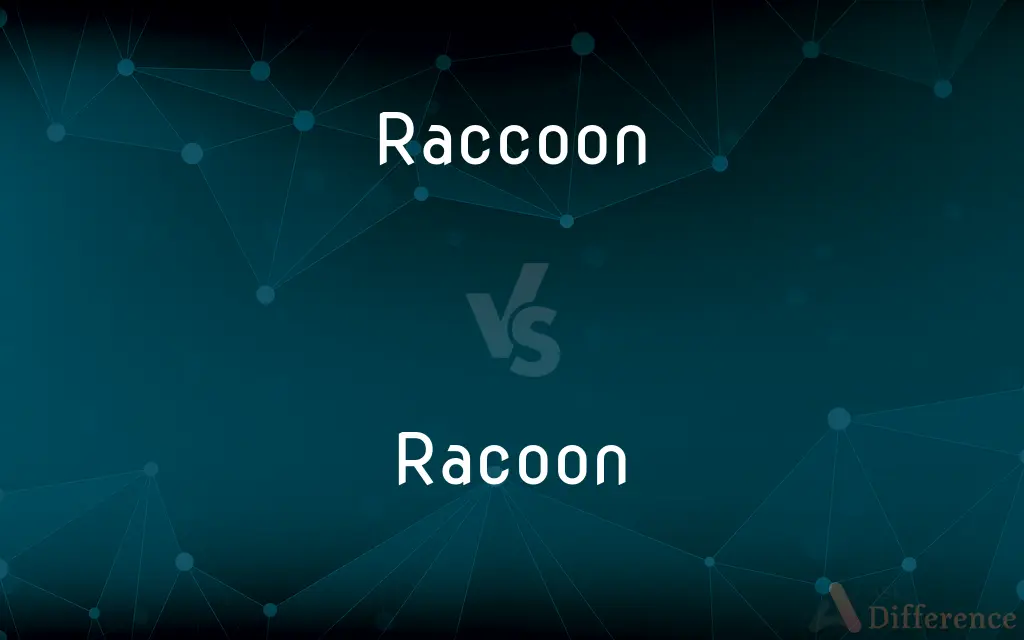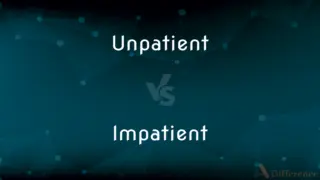Raccoon vs. Racoon — Which is Correct Spelling?
By Tayyaba Rehman & Fiza Rafique — Updated on March 18, 2024
The correct spelling is "Raccoon," while "Racoon" is incorrect. Raccoons are nocturnal mammals known for their cleverness and adaptability.

Table of Contents
Which is correct: Raccoon or Racoon
How to spell Raccoon?

Raccoon
Correct Spelling

Racoon
Incorrect Spelling
ADVERTISEMENT
Key Differences
Double the "c" and "o" to spell Raccoon correctly.
Think of the word "coon," a slang term for raccoon, which contains two 'o's.
Use the mnemonic: Real Animals Can Climb Over Obstacles Naturally.
Visualize two pairs of eyes in the middle of the word (cc and oo) for the nocturnal creature.
Remember that "raccoon" has eight letters, just like the word "nocturnal," which describes them.
ADVERTISEMENT
How Do You Spell Racoon Correctly?
Incorrect: A baby racoon was rescued from the storm drain.
Correct: A baby raccoon was rescued from the storm drain.
Incorrect: I saw a racoon rummaging through the garbage last night.
Correct: I saw a raccoon rummaging through the garbage last night.
Incorrect: Their dog chased a racoon up a tree.
Correct: Their dog chased a raccoon up a tree.
Incorrect: She found a racoon in her backyard and called animal control.
Correct: She found a raccoon in her backyard and called animal control.
Incorrect: The racoon washed its food before eating.
Correct: The raccoon washed its food before eating.
Raccoon Definitions
Raccoon is a North American mammal known for its dexterity and bandit-like face mask.
A raccoon rummaged through our trash last night.
Raccoons are known for their distinctive black "masks."
The raccoon's mask helps it see better at night.
Raccoons are intelligent creatures, skilled in problem-solving.
The raccoon easily figured out how to open the jar.
Raccoons are omnivorous and eat a varied diet.
The raccoon was eating fruits, insects, and small rodents.
Raccoons are primarily nocturnal animals.
I spotted a raccoon scurrying away in the dark.
The raccoon ( or US: (listen), Procyon lotor), sometimes called the common raccoon to distinguish it from other species, is a medium-sized mammal native to North America. It is the largest of the procyonid family, having a body length of 40 to 70 cm (16 to 28 in), and a body weight of 5 to 26 kg (11 to 57 lb).
An omnivorous mammal (Procyon lotor) native to the Americas and introduced elsewhere, having grayish-brown fur, black masklike facial markings, and a black-ringed bushy tail.
The fur of this mammal.
Any of various similar or related animals.
An omnivorous, nocturnal mammal native to North America, typically with a mixture of gray, brown, and black fur, a mask-like marking around the eyes and a striped tail; Procyon lotor.
Any mammal of the genus Procyon.
Any mammal of the subfamily Procyoninae, a procyonine.
Any mammal of the family Procyonidae, a procyonid.
Any mammal superficially resembling a raccoon, such as a raccoon dog.
A North American nocturnal carnivore (Procyon lotor) allied to the bears, but much smaller, and having a long, full tail, banded with black and gray. Its body is gray, varied with black and white. Called also coon, and mapach.
The fur of the North American racoon
An omnivorous nocturnal mammal native to North America and Central America
Raccoon Meaning in a Sentence
The raccoon washed its food in the water, a behavior called "dousing."
The raccoon left muddy paw prints on the porch.
The raccoon climbed the tree with surprising agility.
The mother raccoon teaches her young to hunt and forage.
Raccoon tracks can often be found near streams and lakes.
Common Curiosities
What is the verb form of Raccoon?
There is no standard verb form of "Raccoon."
What is the pronunciation of Raccoon?
It is pronounced as /rəˈkuːn/.
Which preposition is used with Raccoon?
Various prepositions like "of," "in," or "on" can be used with "Raccoon" depending on the sentence.
Why is it called Raccoon?
The name "Raccoon" is derived from the Native American (Powhatan) word "aroughcun" or "arakun."
Which article is used with Raccoon?
Both "a" and "the" can be used with "Raccoon."
Is Raccoon a negative or positive word?
It is neutral; the connotation depends on context.
What is the root word of Raccoon?
The root word comes from the Native American (Powhatan) language.
Which conjunction is used with Raccoon?
Any conjunction can be used with "Raccoon," depending on the context.
Is Raccoon an abstract noun?
No, it's a concrete noun.
Which vowel is used before Raccoon?
Typically, "a" or "the" precede "Raccoon," but these are articles, not vowels.
What is the singular form of Raccoon?
The singular form is "Raccoon."
What is the plural form of Raccoon?
The plural form is "Raccoons."
Is the word Raccoon imperative?
No, it is not imperative.
How many syllables are in Raccoon?
There are two syllables in "Raccoon."
What is a stressed syllable in Raccoon?
The last syllable, "coon," is stressed.
Is the Raccoon term a metaphor?
Not inherently, but it can be used metaphorically.
Is Raccoon a vowel or consonant?
"Raccoon" is a word, not a vowel or consonant.
Is Raccoon a countable noun?
Yes, it is a countable noun.
Is the word Raccoon a Gerund?
No, it is not a gerund.
Is the word "Raccoon" a Direct object or an Indirect object?
It can be either, depending on the sentence.
Which determiner is used with Raccoon?
Any determiner like "a," "the," or "some" can be used.
Is Raccoon a noun or adjective?
"Raccoon" is a noun.
What is another term for Raccoon?
"Trash panda" is a colloquial term for "Raccoon."
How is Raccoon used in a sentence?
Example: "The raccoon was rummaging through my garbage cans last night."
Is Raccoon an adverb?
No, it's not an adverb.
Is Raccoon a collective noun?
No, it is not a collective noun.
How do we divide Raccoon into syllables?
It is divided as rac-coon.
What part of speech is Raccoon?
It is a noun.
What is the opposite of Raccoon?
There is no direct opposite of "Raccoon."
Share Your Discovery

Previous Comparison
Unpatient vs. Impatient
Next Comparison
Geneology vs. GenealogyAuthor Spotlight
Written by
Tayyaba RehmanTayyaba Rehman is a distinguished writer, currently serving as a primary contributor to askdifference.com. As a researcher in semantics and etymology, Tayyaba's passion for the complexity of languages and their distinctions has found a perfect home on the platform. Tayyaba delves into the intricacies of language, distinguishing between commonly confused words and phrases, thereby providing clarity for readers worldwide.
Co-written by
Fiza RafiqueFiza Rafique is a skilled content writer at AskDifference.com, where she meticulously refines and enhances written pieces. Drawing from her vast editorial expertise, Fiza ensures clarity, accuracy, and precision in every article. Passionate about language, she continually seeks to elevate the quality of content for readers worldwide.












































